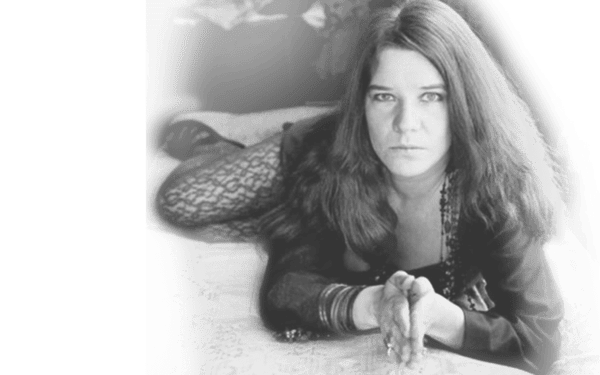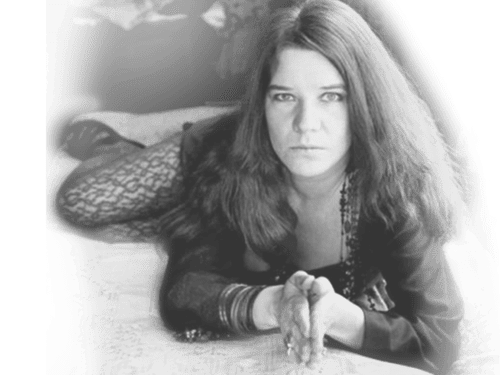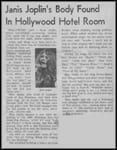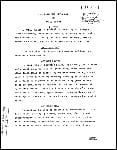The program opens with “Me & Bobby Me Gee”
Laura reads one Janis’ letters: “June 6, 1966 Mother & Dad: With a great deal of trepidation, I bring news. I’m in San Francisco. Now, let me explain. It seems Chet Helms (old friend) now is Mr. big in San Francisco. Owns three big working rock ‘n’ roll bands with bizarre names like Captain Beefheart & His Magic Band and Big Brother & The Holding Co. etc. Well, Big Brother needs a vocalist, so I called Chet to talk to him about it. He encouraged me to come out–it seems the whole city has gone rock ‘n’ roll, and it has–and assured me fame and fortune. Right now my position is ambivalent. I’m not at all sold on the idea of becoming the poor man’s Cher. But I really do think there’s an awfully good chance I won’t blow it this time. there’s really nothing more I can say now. Guess I’ll write more when I have more news. Until then, please address all criticism to the above address. And please believe you can’t possibly want for me to be a winner more than I do. Love, Janis”
Terri Gross: “Why was she apologizing to your parents at that point?”
Laura: “Well, I think she’s talking about the fact that she’s dropped out of college a few times and she went out to California once before and got in trouble with drugs and got very much on the edge. I think she scared herself to death and felt that if she stayed out there that she probably wouldn’t be living very much longer, so she came home. When she did, that was the first time in her life that she started listening to what my parents were really saying. Janis was trying to take advantage of the wisdom of elders and others…going to see a psychologist and being serious about studying and college. She was trying to live the kind of life that she felt was the one our parents would think was the best one for her. So here she is leaving that effort and going out AGAIN to California, a place where she’s already blown it before.”
Terri: “What are the things that seem to set Janis a part from her friends and school mates before she became famous and before those differences could be expressed through the counterculture?”
Laura: “I think one thing that’s important to understand is Janis didn’t set herself single a part when she was in Texas. She, with a whole group of people, took up a different banner. And that banner was one that was laid out for them within the beatnik literature, the beatnik music, the beatnik culture, the beatnik dress. One of the dominant themes that spoke so loudly in this small southern town had to do with racial equality. Because, remember, Janis grew up at a time when integration was just beginning—the marches were just starting, the sit-ins. Her timing in high school and junior high was filled with those kind of images in the paper and the news. It was the topic for her group: the fact that we lived in a VERY segregated southern town and this was not right. They found a source for believing in equality and believing in the qualities expressed in the beatnik literature and also in the black blues music. All those things kind of came together, and certainly as a group set themselves a part from the people that believed in the status quo in society.”
Terri: “I’m wondering if when Janis was a teenager if you felt she was comfortable about herself physically. If she felt attractive, if she felt self-conscious about herself in her body?”
Laura: (she laughs quietly) “I think that Janis was pretty blatant, she felt she was over-weight and had pimples and that her heart was grand and big and her mind was awesome but she was judged too much by her size and her physique. I think there was a great deal of resentment that she had about it then. The thing I found interesting in doing research is that here Janis was singing—this tremendous powerful folk singer—and here she goes out to San Francisco and she’s singing this awesome music and you know when she became successful and made that leap is when she started wearing sexy clothes and showing a little cleavage, It made her angry that as soon as she was willing to play the game THEN she got the accolades, but it was the same person and the same skill.”
Terri: “Do you think she liked it in a way too, that her body which had been considered to be unattractive was suddenly something that everybody wanted and admired?”
Laura: “Oh, God! I think she loved it! Ya, Janis’ weight went up and down but clearly you can see there are a lot of great photos of Janis where she took great pride in being beautiful. Even the whole idea that she had a quasi-nude pin-up, art pin-up, photo taken of her when she was first out in Haight-Ashbury. She wrote home to my parents saying “Can I send you one? It hardly shows.” She was really excited and thrilled that people were finding Janis’ body beautiful.”
Terri: “ Yes. Do you remember the first time you saw your sister in concert?”
Laura: (pause) “Well, actually, the first time I saw Janis was in a concert with Big Brother & the holding Company at, I believe, the Avalon Ballroom out in Haight-Ashbury. When she’d been out there for one whole summer my parents said, hmmmm, something’s happening and so we took a family trip out to California. One of the things we did was get to go watch them perform. And it was pretty spectacular and totally different. the music was loud, overpowering and Janis was larger than life. I think that the audience was equally as interesting to watch as the people on stage for someone who was not at all in the scene. I think that most people were very stoned and rather than, say, dancing and moving along, it was…they were all just frozen in place, just staring. It was…just…different.”
“Piece of My Heart”
Terri: “What do you think it said to you about your friends when your sister became a star? How did that change your identity in your circles?”
Laura: “I know that Janis’ career affected my life, but Janis’ career, in terms of my friends being aware of it -because of the press- was only a couple years before she died. She was only in the spotlight publicly for about 4 years. It took a couple of those years for her to get big enough to be recognized. I think that for me what was so BIG was her death, and everything else just pales in comparison. When she died it was such a traumatic thing that it changed my life significantly so it’s hard for me to see the other things—though I’m sure there were things there.”
Terri: “Your parents were of course concerned about your sister’s life of extremes and non-conformity and excess…did they take any pleasure in her success?”
Laura: “Oh! A lot! Ya, ya. I think mother was very supportive. She kept scrapbooks, you know, and letters and would send clothes and ideas about things and songs. Tried to very clearly be involved. I think they went to all the shows that were any where close to our home town. That was the tenor of the letters and correspondence and telephone calls. But there was also, you know, the questioning.”
Terri: “What were the conversations like in the house about her?”
Laura: “Mostly just, “oh…I heard Janis was playing in such-in-such,” you know those kinds of things, kinda personal stuff—”she called,” “she bought a new car,” or “she bought a new house, oh wow, that should be fun.” Then every once in a while you’d have an idea that…”Janis got arrested down in Florida for using profanity on stage” and you go…”oh, geez”…it’s like, her life clearly had its ups and downs.”
Terri: “Do you feel you’ve been able to maintain a sense of her as your sister even after she became an icon?”
Laura: “I think that was a challenge for me for many years. I have finally come to the realization that the sister I knew, the memories I have are mine, they’re inside me and it’s my relationship with her. That’s different than the woman who is a social icon. The fans that have a relationship with her—she speaks somewhere deep within them—that their relationship with her is just as powerful and just as meaningful to them and I don’t think those have to necessarily be the same thing. So I look at it as…after her death Janis developed a second career. The second career is being a social icon and a social icon’s job essentially is to reflect back to people some aspects of that person’s personality which society wants to use collectively at a certain point in time. so she’s not a whole person, that’s not what an icon is, they’re a caricature of just portions of a person’s personality.”
Terri: “Laura Joplin reads some of Janis’ letters home on a VH1 documentary about Janis which is running this week as part of their “Legends” series.”





